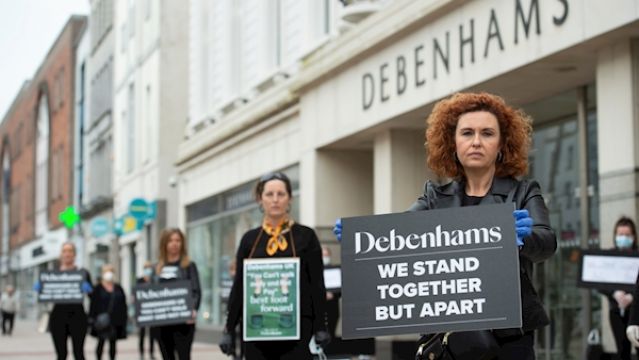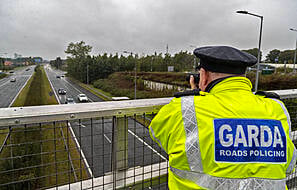What’s going on?
The Irish arm of retailer Debenhams, which operated 11 stores, was placed into liquidation in April. The store closures came after the UK parent company entered administration and ended its financial support of the Irish business.
Some 1,000 staff directly employed by Debenhams Retail Ireland and hundreds more working in concession outlets in the shops - who were already on temporary layoffs due to the Covid-19 pandemic - lost their jobs.
Why did the former workers begin picketing?
The former Debenhams workers began picketing in a dispute with the firm over redundancy terms.
The staff say the package offered to them when the company was liquidated, a statutory redundancy payout of two weeks of salary per year of service, was unfair.
What do the former workers want?
The workers are seeking redundancy terms of two weeks’ pay per year of service, plus statutory redundancy entitlements of two weeks per year of service. The workers say this matches an agreement between the retailer and trade union Mandate made in 2016.
The workers are also calling on the Government to waive some €20 million owed to Revenue and local authorities through the liquidation process, so it can be used to boost workers’ redundancy packages.
What is happening at the pickets?
The workers have been blocking the removal of stock from the stores around the country since their closure.
Former workers say that stock currently in shuttered stores, valued at an estimated €25 million, could be sold with the proceeds distributed as part of a redundancy deal.
Who else is involved?
The former Debenhams workers are represented by a trade union, Mandate.
Mandate has attempted to settle the dispute through negotiations with the liquidators of Debenhams Irish operation, KPMG.
Could they reach an agreement?
A potential deal between KPMG and Mandate was announced in September, which would have seen workers share a €1 million allocation on top of statutory entitlements from the sale of stock.
However, former workers continued to demonstrate, saying that the deal failed to deliver four weeks’ pay per service year.
Weren’t some of the former workers arrested?
Six people were arrested at a protest at the former store on Henry Street in Dublin in September, with gardaí citing trespassing under the Public Order Act as the reason.
The six protesters were detained at Store Street Garda station in Dublin but later released pending further investigations. It is understood that three of those who were taken into custody were former workers at the store.
An occupation also took place of a former store on Patrick Street, Cork, on the same day, which ended peacefully.
Where do things stand now?
On Tuesday this week, Debenhams’ liquidators were granted an injunction by the High Court which prevents “unlawful actions” and any interference with their attempts to remove stock from the former stores.
It means that former workers who continue to prevent stock from leaving the stores could run the risk of imprisonment.
Has the Government gotten involved?
Speaking in the Dáil, Taoiseach Micheál Martin previously described the treatment of Debenhams workers as "shabby and shoddy" and said that the Government had communicated its views to the company.
TDs, including Sinn Féin leader Mary Lou McDonald and People Before Profit’s Bríd Smith, recently joined former workers on the picket line in support of their campaign.
Speaking in the Dáil yesterday, People Before Profit TD Richard Boyd Barrett said that the Debenhams parent company had “tactically unloaded €200 million of debt onto Debenhams Ireland”.
He said that after giving court evidence in April that its online business worth €30 million was part of Debenhams Ireland, the company then said it was not a part of the Ireland operation a few days later.
In response to Mr Boyd Barrett’s calls for Government action, Taoiseach Micheál Martin said though he saluted the workers in their campaign, the “Government cannot instruct the liquidator or the High Court process.”
Mr Martin warned of a precedent where “employers can renege on their obligations in the future if the Government is always there to bail them out.”
“That is a potential solution. Irrespective of companies reneging on or failing to honour their collective agreements, the Government ends up being the bank of last resort of those collective agreements,” he said.







